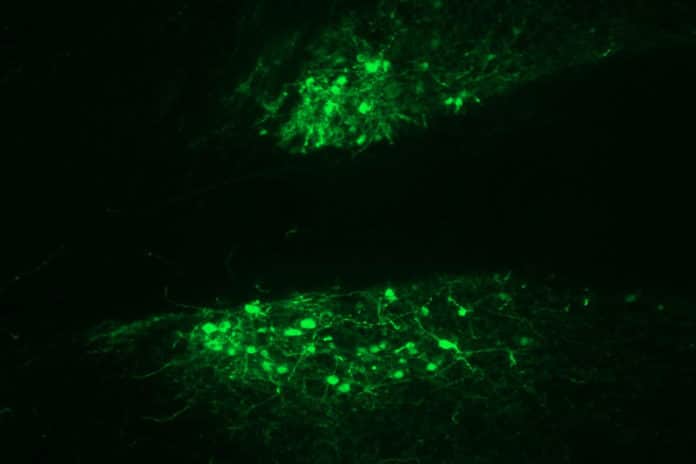Binge drinking is defined as consuming alcohol in a pattern that produces a blood alcohol concentration (BAC) to 0.08 grams percent or above. This amounts to a man having roughly five drinks or a woman having four drinks in approximately two hours.
Over 50% of all the alcohol consumed by people is served during binge drinking. It’s risky behavior, and one consequence of repeated binge drinking is increasing the risk of developing an alcohol use disorder.
In a new study by the Medical University of South Carolina, scientists tested a potential strategy for reducing risky binge drinking.
They discovered that deactivating a stress-signaling system in a brain area known for motivation and emotion-related behaviors decrease binge drinking.
JR Haun, a graduate student in the Becker laboratory and first author of the study, said, “Through our investigation, we found a brain region and a system that we can manipulate to decrease binge drinking.”
Scientists investigated the opioid receptor system. The opioid receptor system is well well-recognized in the addiction field. Notorious narcotic drugs of abuse, such as morphine, heroin, and oxycontin/oxycodone, act on the opioid-receptor system, producing the pleasurable effects that make these drugs so addictive.
Dr. Howard Becker, director of the Charleston Alcohol Research Center, said, “I think the ultimate goal is to understand better new potential treatment targets and how new therapeutics may have some value in helping to quell the desire and motivation to drink excessively in those who have developed an alcohol use disorder or are on the threshold of doing so.”
Haun said, “However, there is an odd opioid receptor out, so to speak, that is not involved in signaling pleasure. The kappa-opioid receptor system is the antithesis of other opioid receptors. It’s often referred to as an anti-reward system.”
Instead of producing feelings of pressure, the kappa opioid receptor produces stress and discontent. When people drink and experience positive effects, that is partially due to pleasurable opioid receptors being activated. However, after they have finished drinking, and nausea, headache, and the stress of withdrawal start to set in, the kappa opioid receptor system has been activated.
Deactivating kappa opioid receptors in the brain decreased binge drinking. This finding suggests that the kappa opioid receptor system is essential not only in the negative state of withdrawal but also in driving binge drinking itself.
To determine how kappa opioid receptors in the extended amygdala affect binge drinking, scientists specifically inactivated kappa opioid receptors in this region in mice.
After blocking the kappa opioid receptors in these mice, the team tested how much alcohol the animals voluntarily consumed. What they found could have important implications for future treatments of chronic binge drinking.
Haun said, “Blocking these kappa receptors in the extended amygdala didn’t completely abolish drinking. It brought it down to a more moderate level, the equivalent is a glass of wine at dinner opposed to a bottle.”
Meanwhile, the kappa opioid receptor system in the extended amygdala promotes binge drinking. And, blocking kappa opioid receptors in the extended amygdala, therefore, could act as a therapy to taper binge drinking.
Becker said, “I think the ultimate goal is to understand better new potential treatment targets and how new therapeutics may have some value in helping to quell the desire and motivation to drink excessively in those who have developed an alcohol use disorder or are on the threshold of doing so.”
Journal Reference:
- Kappa opioid receptors in the bed nucleus of the stria terminalis regulate binge-like alcohol consumption in male and female mice. DOI: 10.1016/j.neuropharm.2020.107984
